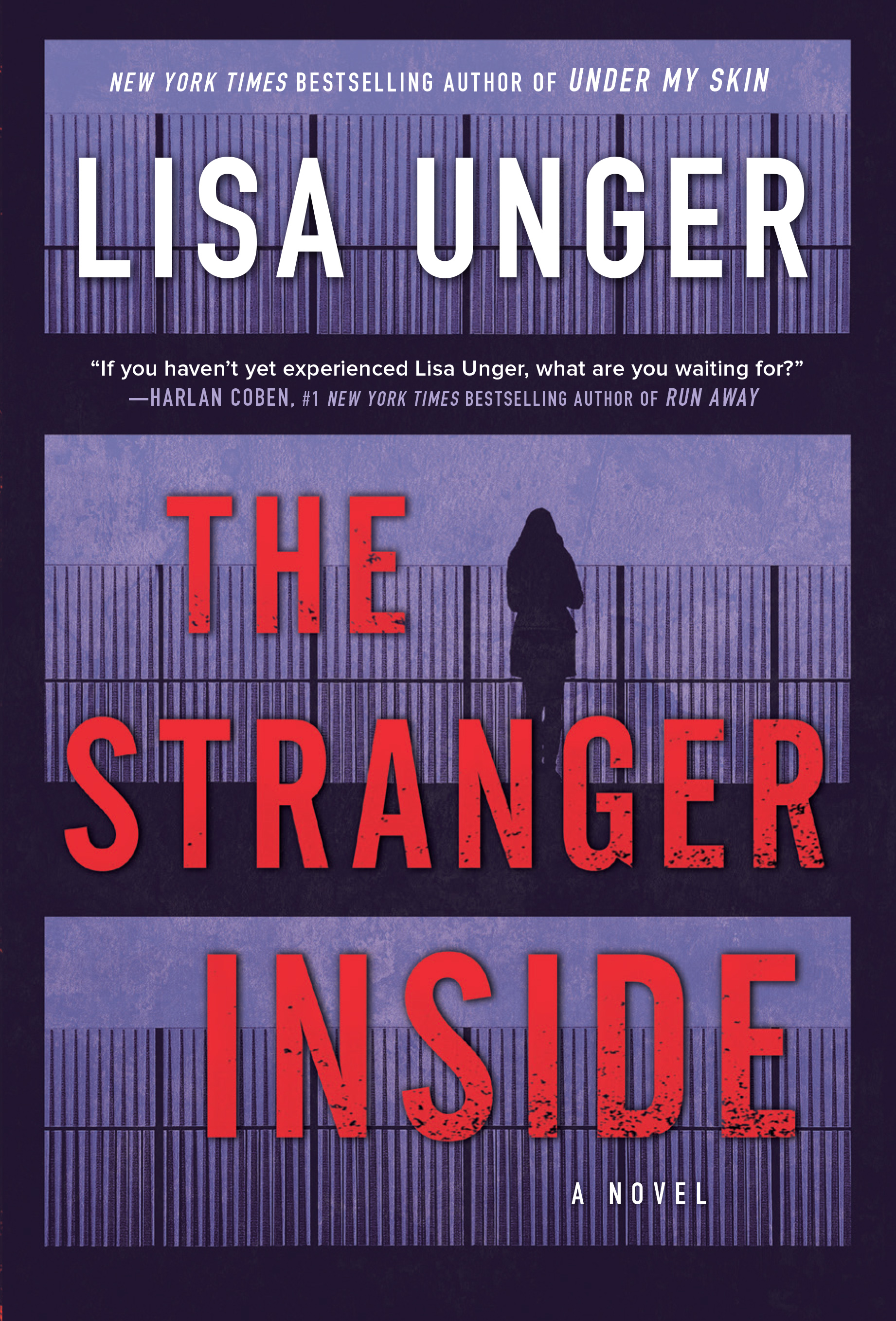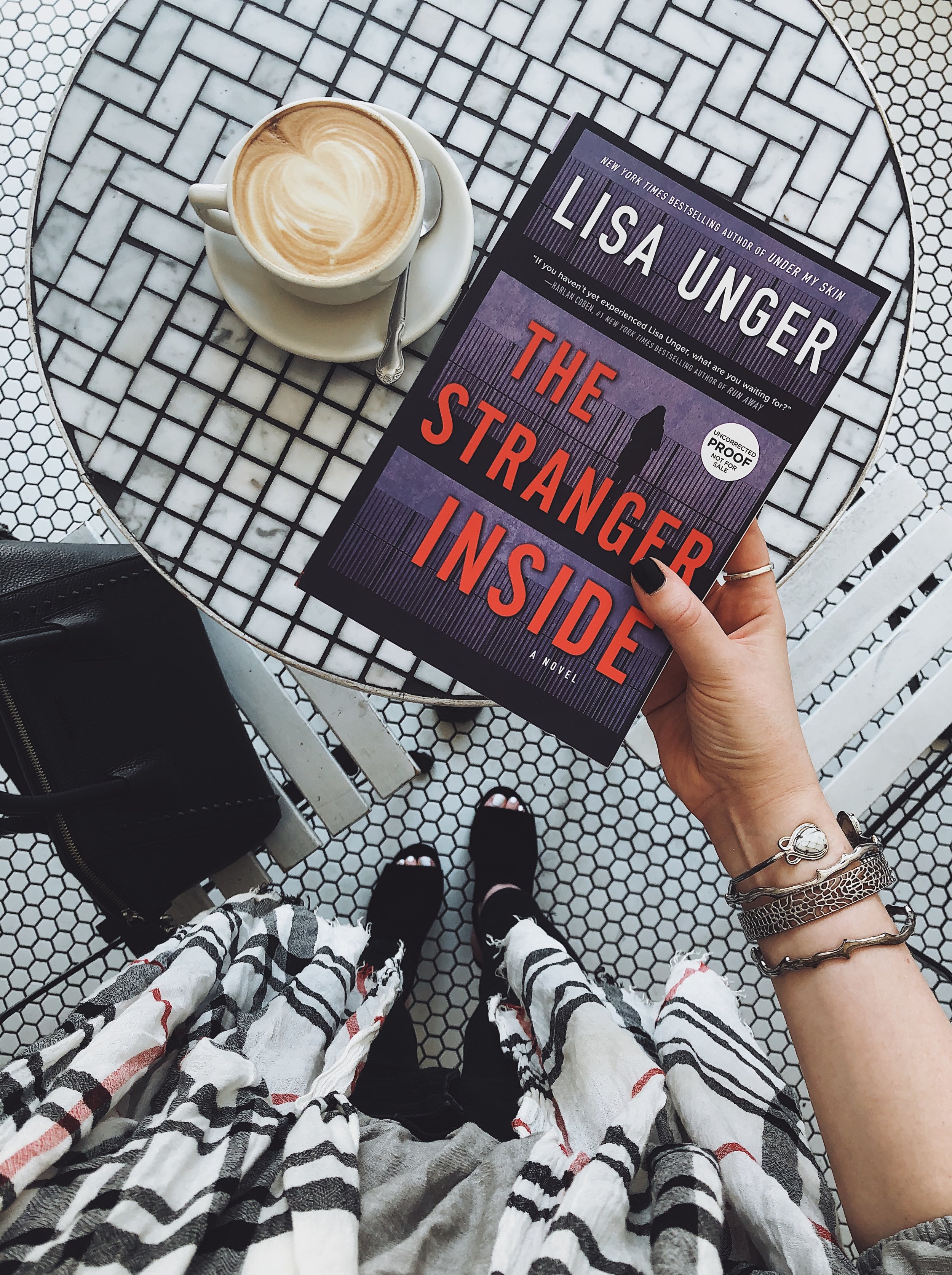THE STRANGER INSIDE by Lisa Unger
Park Row | Available September 17, 2019
If you’ve been a crime fiction fan for even a short while, there’s a very good chance you’ve heard of Lisa Unger—and if you haven’t heard of her yet, not to worry, today’s post will serve as the perfect introduction to this prolific author’s work. Lisa Unger is the New York Times bestselling author of seventeen novels, including her forthcoming release THE STRANGER INSIDE. Lisa Unger’s novels have been published in twenty-six languages, and Lisa has received multiple Edgar Award nominations, among numerous other accolades. Her books have been selected as “Best of the Year” picks by the Today Show, Good Morning America, Entertainment Weekly, Amazon, IndieBound, and many, many more. I could go on, but you get the picture: Lisa Unger is a master of the suspense genre with a huge readership around the world. And today on CBTB, I’m so thrilled to spotlight Lisa’s forthcoming release THE STRANGER INSIDE, available September 17th from Park Row.
Thanks to the team at Park Row, CBTB readers can dig into an excerpt from Lisa Unger’s newest novel right here! In this post, you’ll find plot details and early praise for THE STRANGER INSIDE by Lisa Unger, plus an exclusive excerpt to give you a sneak peek into this gripping suspense read. Be sure to follow along with CBTB on Instagram to keep up with my thoughts on Lisa Unger’s newest novel while I read it this week!
THE STRANGER INSIDE by Lisa Unger
About the Book:
Even good people are drawn to do evil things…
Twelve-year-old Rain Winter narrowly escaped an abduction while walking to a friend’s house. Her two best friends, Tess and Hank, were not as lucky. Tess never came home, and Hank was held in captivity before managing to escape. Their abductor was sent to prison but years later was released. Then someone delivered real justice—and killed him in cold blood.
Now Rain is living the perfect suburban life, her dark childhood buried deep. She spends her days as a stay-at-home mom, having put aside her career as a hard-hitting journalist to care for her infant daughter. But when another brutal murderer who escaped justice is found dead, Rain is unexpectedly drawn into the case. Eerie similarities to the murder of her friends’ abductor force Rain to revisit memories she’s worked hard to leave behind. Is there a vigilante at work? Who is the next target? Why can’t Rain just let it go?
Introducing one of the most compelling and original killers in crime fiction today, Lisa Unger takes readers deep inside the minds of both perpetrator and victim, blurring the lines between right and wrong, crime and justice, and showing that sometimes people deserve what comes to them.
“Unger skillfully peels back the layers in this astute, engrossing thriller.” —Kirkus Reviews, starred review
"A darkly thrilling tale of survival and obsession. Lisa Unger never disappoints." —Riley Sager, bestselling author of Lock Every Door
“It’s not often that I’m stunned by the ending to a novel. But The Stranger Inside is rich with surprise from the very first page. It’s a smart, taut thriller.” —Chris Bohjalian, bestselling author of The Flight Attendant and Midwives
“Unger’s well-honed craft shows in her unmasking the avenger early on and using the reveal to ratchet up suspense. She also squirrels away several startling trump cards for later. Fans of serial killer novels won’t be disappointed.” —Publishers Weekly
Excerpt: THE STRANGER INSIDE
By Lisa Unger
Last Night
I wait because I have nothing but time.
From the quiet, dim interior of my car, I watch the quiet neighborhood, settle into the upholstery. Autumn. Leaves lofting on cool air. Tacky, ghoulish Halloween decorations adorning stoops and lawns, hanging from trees—skeletons, and jack-o’-lanterns, witches on brooms. It’s a school night, so no kids playing flashlight tag, no pick-up soccer match in the street. Maybe kids don’t even do that anymore. That’s what I understand anyway. That they’re all iPad-addicted couch potatoes now. It’s the new frontier of parenting. But you’ll know better about this than I’m likely to.
Younger families live on this block. SUVs are hastily parked. Basketball hoops tilt in driveways; bikes twist on the lawn. Recycling cans wait patiently at the curb on Wednesday, garbage on Friday. Tonight, there’s a game on. I see it playing on big-screen televisions in three different open-plan living rooms.
But the house I’m watching is dark. A beautiful silver Benz that’s about to be repossessed sits in the driveway. It’s one of those cars—the kind that people dream about, an aspirational car, the kind you get when… But it certainly hasn’t brought its owner any happiness. The guy I’m watching—he’s depressed. I can see it in his slouch as he comes and goes, in the haunted circles that have settled around his eyes.
I can’t muster any compassion for him. And I know that you aren’t shedding any tears. In fact, I’m willing to bet that you’ve spent at least as much time thinking about him as I have—even though, of course, you have other things on your mind now.
An older man walks his dog, a white puff of a thing on a slender leash. Not a dog at all really, more like an extra-large guinea pig. I sink a little deeper in my seat, then stay stone-still. I haven’t seen this man on this street before, and I’ve been here most nights for a while. He’s out of his routine, I guess, maybe decided to take a new route tonight. I’m not too worried, though. My car—a beige Toyota Corolla—is utterly forgettable, practically invisible in its commonness; the windows tinted (but not too dark). If he doesn’t see me, a lone person slouched in the driver’s seat and clearly up to no good, he won’t even notice it.
I’m in luck. He’s squinting at the screen on his smart phone. Older, not fluent with it, it takes all his concentration. That device is the best thing that ever happened to people who want to be invisible. He walks right by, oblivious to the car, to me, to his surroundings. Even his dog is distracted, incurious, nose to the pavement. Sniff, sniff, sniff. Finally, they’re gone and I’m alone again.
Time passes. I breathe into the night.
One by one, windows go dark except for the odd light here and there. There’s an insomniac in 704, a nurse who comes home after 3 a.m. on Wednesdays and Fridays to 708.
Just after 2 a.m., I slip from the car, close the door silently and shoulder my pack. I am a shadow shifting through the shadows of the trees, drifting, silent, up the edge of the house. I easily pick the lock on the side entrance—you can learn how to do anything on YouTube these days—and enter the house through the unlocked interior door. From the garage into the laundry room. From the laundry room into the kitchen—a typical suburban layout. I stand inside for a moment, listening.
I can still hear it, you know, the sound of her father’s voice. I am willing to bet that you hear it, too. Maybe in those quiet moments, when you lie in bed at night, the wail of total despair comes back like a haunting. I imagine that your mind drifts back to that courtroom. Your face pulled tight with that helpless mingle of anger and sorrow, nostrils flaring just slightly. I was right there with you even though you didn’t know it. Or maybe you did. Sometimes I wonder if you know how close I am. If you sense me.
When the verdict was delivered, there was a moment, remember? A tiny sliver of time where the information moved through synapses and neurons, a heartbeat. In that breath, I watched her mother drain of what little energy and color remained in her too-thin body. I watched her father buckle over, her brother dip his head into his hands. The unforgiving light of the courtroom grew brighter somehow, an ugly white sizzle. And then the room exploded in a wave of sound that contained all the notes of despair, disbelief, rage. I’d been there before, in the presence of injustice, as have you. You know how it wafts like smoke from the black spaces beneath tables and chairs. It rises up, tall and menacing. I was always here, it seems to say as it looms over you, towering, victorious. It brings you to your knees. In the presence of nothing else do you feel smaller or more powerless.
When we’re young, we’re naive enough to believe. We’re raised on the comic book ideal of good vanquishing evil. We believe that white magic is stronger than black. That criminals are punished, and justice is always served. Even when it seems that evil might triumph—no. In the final moment, a cosmic force does the reckoning for good, one way or another. We want to believe that.
But it’s not so. Not always. Sometimes justice needs a little push.
I make a quick loop through the house to assure myself that everything is as it was the last time I was here. The decor is Target, IKEA chic, white and dove gray, with bold accent patterns. There are lots of those picture collages with words like LOVE and DREAM and FAMILY: her parents—smiling and benevolent; her wedding photos—gauzy, a fairy-tale dream; a gaggle of gap-toothed nieces and nephews; girls’ night out, toasting with pink drinks in martini glasses. Throw pillows and soft blankets, knickknacks, decorative pieces of drift wood are artfully arranged. She was house-proud, the woman who lived here once. She liked things pretty and comfortable. Now, surfaces are covered with dust. Her home, it smells like garbage.
As I finish my tour, I feel a twist of sadness for her. Here’s someone who did everything right. She followed all the rules, went to college, worked in public relations, got married, got pregnant. Pretty, and, by all accounts, sweet and kind. And look. Her cute house, her little dreams, her innocent life, empty, rotting. She deserved better.
Nothing I can do about that. But this is the next best thing. I know what you’re thinking. What anyone might think. Who am I to say that a man found innocent by a jury of his peers is guilty as sin? And even if he is, who am I to deliver justice?
It’s true. I am no one. But this is how I knew.
When Laney Markham went missing, I immediately suspected that it was her oh-so-handsome husband. Because let’s get real: the incident of stranger crime is a statistical anomaly. (We both have a thing or two to add to that conversation, don’t we? But I’m sure you’d agree that statistically it’s true.) The idea of the other, the stranger, the destroyer who breaks into your home and kills your family, or takes your child? It does happen. But not as often as a man kills his wife. Or a father rapes his daughter. Or an uncle molests his niece. Those things don’t always make the news. Why? Because it’s not news; that’s the everyday horror show of normal life.
So there’s that. The “it’s-always-the-husband” thing. But what sealed it for me was those national morning show appearances. He did the circuit, ostensibly to plead for the lovely Laney’s safe return. Tall, with movie-star good looks, he was a natural. And those morning show hosts, they lapped it up. Laney? She was a beauty, too. One of those luscious pregnant girls—even prettier with her little baby belly, glowing skin and silky, hormone-rich hair. If the Markhams had been less good-looking, this would have been less of a story. You know it’s true.
Anyway, he gets on camera and starts to weep, and I mean blubber. Steve Markham stares right at the camera, tears streaming down his face and he begs for whoever took his wife and unborn child to just bring them home. Quite a performance.
Except.
Men don’t cry like that. Men, when they are overcome by emotion to the degree that they lose control and start to weep, they cover their faces. Crying is a disobeying of every cultural message a man ever receives. To weep like a woman? It fills him with shame. So he covers his face. That’s how I knew he killed his wife. Steve Markham was a sociopath. Those tears were as fake as they come.
You remember. I know you were thinking the same thing. You might say that’s not enough. I know you; you follow the rules—or anyway you have a kind of code. But we all know there was enough physical evidence to send the bastard to the electric chair. It was those lawyers with all their tricks—cast doubt on this, get that thrown out, confuse and mislead the slack-jawed jury with complicated cell phone evidence. This satellite says he was there at this time, couldn’t have done it.
Still, I generally wait a year. Just to be sure. I watch and wait, do my research. At least a year, sometimes much, much longer, as you know. I choose very carefully. I think about it long and hard. Because it would suck to be wrong. I wouldn’t, couldn’t, justify that. It’s a line I can’t step over. Really. Because then—what am I?
Anyway, my old friend, I’m gratified to report that the year since he was acquitted of his wife’s murder has been very bad for Steve Markham. He lost his job. All his friends. His lover-slash-alibi Tami—you remember her, right? The whole case hung on that mousy blonde from Hoboken. Well, she broke up with him. I’m sure you know all this. If I know you, you’re keeping tabs, too.
You probably didn’t know that for a while he hung around Tami’s place, stalking. I thought we were going to have a problem, that I’d have to act before I was ready. But Steve is nothing else if not a smart guy. Probably figured it wouldn’t look great if his girlfriend turned up dead less than a year after his wife’s body was found in a shallow grave, just miles from her own home, she and her unborn child killed by multiple stab wounds with a six-inch serrated blade (from her own kitchen). He finally stopped following Tami, the one that got away.
He’s about to lose the house. Last month, the lights went out. The pool where they think he killed his wife has turned green, water thick now with algae. Sure, he had his book deal. He did the talk show circuit, this time playing the innocent man, wrongly accused, on a tireless hunt for his wife’s killer. He’d been unfaithful, he admitted, grim and remorseful. He was sorry. So sorry. More crocodile tears.
He burned through the advance money fast. It wasn’t that much. Between agent commission, taxes, it was no windfall. He might have made it last. But people don’t get it. Money, if you don’t protect it, is flammable. It goes up in flames and floats away like ash. The IRS is after him now. The system. Maybe it does have its ways of getting you, even if you slip through its cracks at first.
I make no attempt to be quiet as I unpack my bag. I drape a plastic tarp over the couch, lay another one in front of the door where he will enter the room when he hears me. I lay things out. The duct tape. The hunting knife. There’s a gun I carry in a shoulder holster, the sleek, light Beretta PX4 Compact Carry with a handy AmeriGlo night sight and Talon grip. It’s only meant to inspire cooperation. To have to use it will represent a failure of planning on my part. But there are always variables for which you can’t account.
By the time he rouses from sleep and moves cautiously into the front room, I am sitting in one of the cheap wingback chairs by the window. He is not armed. I know there is no weapon in this house. There was a baseball bat under the bed. Maybe he thought that someday Laney’s brother or her father would come for him. But the baseball bat is gone now. In the trunk of my very forgettable car, in fact.
“Hello, Steve,” I say quietly and watch him jump back. “Have a seat.”
“Who are you?”
I work the Cerakote slide that puts a bullet into the chamber and watch him freeze. It’s a sound a man recognizes even if he’s never had a gun pulled on him before.
“On the couch.”
The plastic tarp crinkles beneath his weight and he starts to cry again. This time? It’s real.
“Please.” His voice is small with fear and regret.
But do I also hear relief?
We all believe that story, that cheaters never win, and justice will be done. Even the bad guys believe it.
Isn’t that right, my old friend?
Excerpted from The Stranger Inside. Copyright © 2019 by Lisa Unger. All rights reserved. No part of this excerpt may be reproduced or reprinted without permission from the publisher.
Book Details:
Hardcover: 384 pages
Publisher: Park Row; Original edition (September 17, 2019)
Language: English
ISBN-10: 0778308723
ISBN-13: 978-0778308720
Crime by the Book is a participant in the Amazon Services LLC Associates Program, an affiliate advertising program designed to provide a means for sites to earn advertising fees by advertising and linking to Amazon.com. This in no way affects my opinion of the books included in this post.













Home ownership feel like a distant dream? Zillow listings have you convinced you’ll be renting for the rest of your life? The woman at the heart of Carissa Orlando’s debut The September House feels your pain—and she’s prepared to put up with a lot if it means she and her husband can finally have a place to call their own. In this case, that might just mean living in a house that’s haunted. Playful and irreverent, spine-tingling and spooky, The September House puts a fresh spin on the classic haunted house story, delivering an immersive tale about the secrets lurking within one building’s walls, and within the lives of its inhabitants.